Edith Cowan University: Reflection on Clinical Interpersonal Skills
VerifiedAdded on 2023/01/07
|5
|978
|58
Journal and Reflective Writing
AI Summary
This assignment is a reflective journal entry detailing a student's experience and skills in a clinical setting, specifically focusing on interpersonal negotiation and conflict resolution. The student utilized the Gibbs model to analyze a case involving a patient with mental health challenges, highlighting the importance of effective communication, empathy, and active listening. The reflection describes the challenges faced, the strategies employed, and the positive outcomes achieved, emphasizing the role of building trust and rapport. The student evaluates the experience, identifying strengths such as patience and empathy, and areas for improvement like team working and public speaking. The conclusion underscores the significance of interpersonal skills in healthcare, and an action plan outlines steps for further skill development. References to supporting literature are also included.
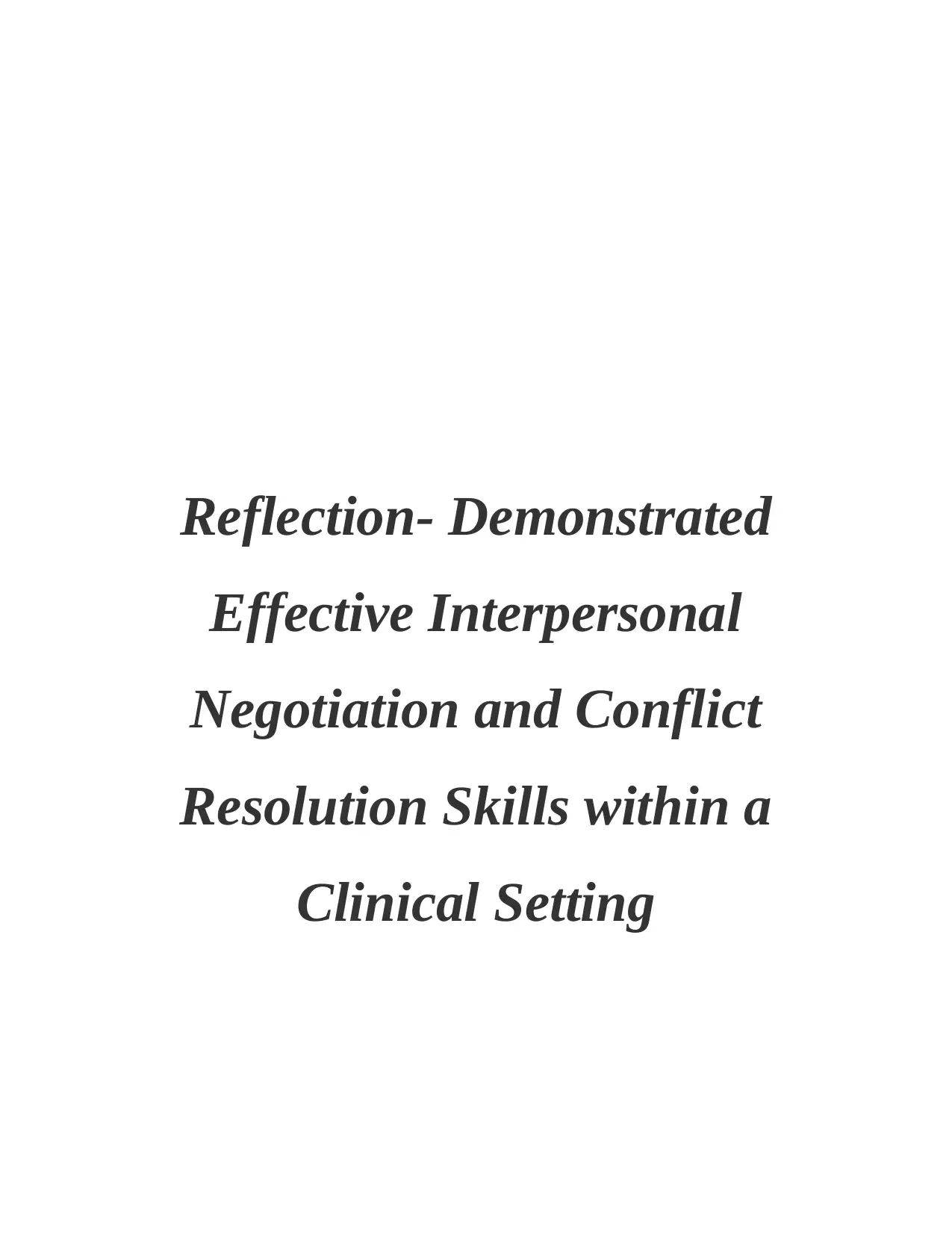
Reflection- Demonstrated
Effective Interpersonal
Negotiation and Conflict
Resolution Skills within a
Clinical Setting
Effective Interpersonal
Negotiation and Conflict
Resolution Skills within a
Clinical Setting
Paraphrase This Document
Need a fresh take? Get an instant paraphrase of this document with our AI Paraphraser
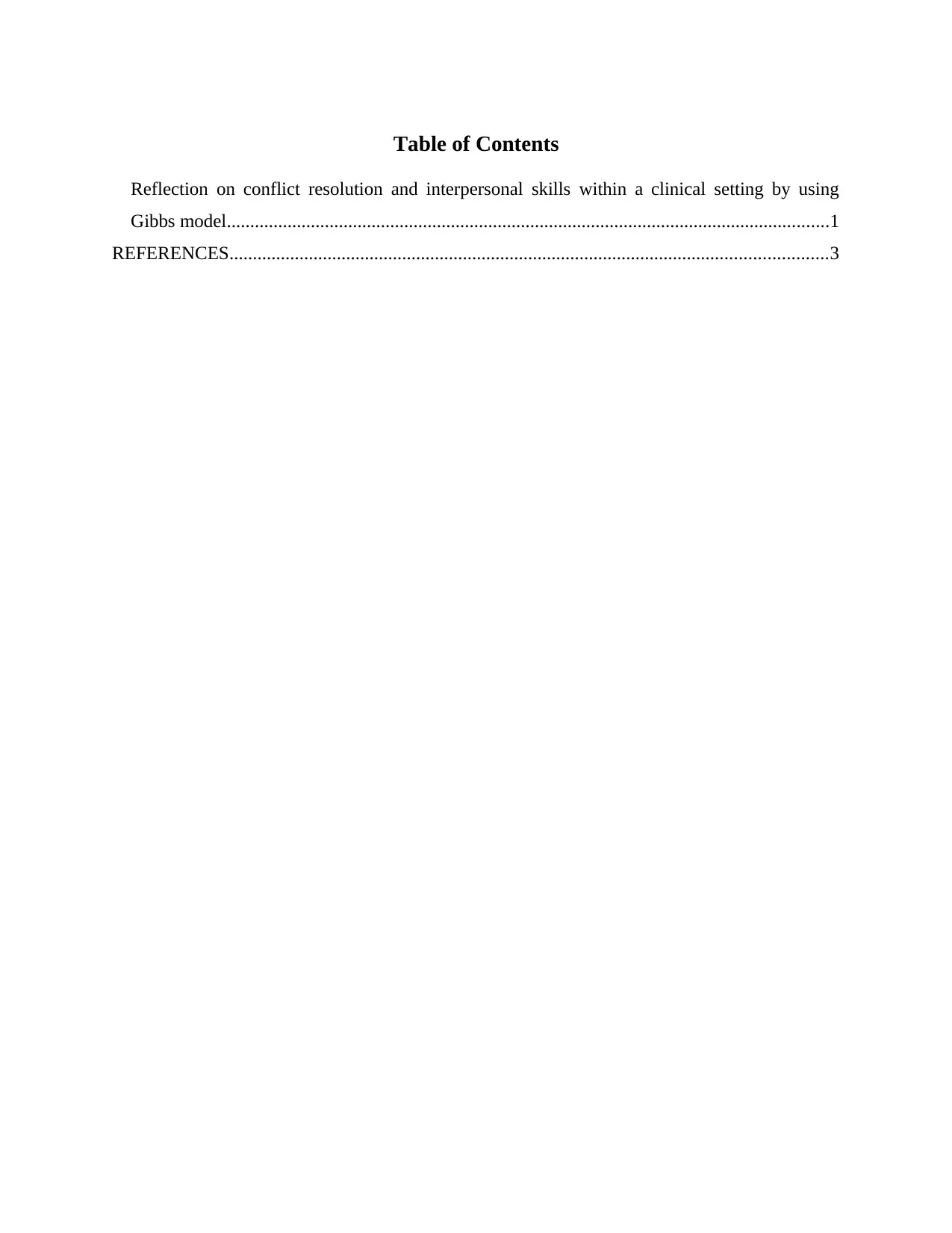
Table of Contents
Reflection on conflict resolution and interpersonal skills within a clinical setting by using
Gibbs model.................................................................................................................................1
REFERENCES................................................................................................................................3
Reflection on conflict resolution and interpersonal skills within a clinical setting by using
Gibbs model.................................................................................................................................1
REFERENCES................................................................................................................................3
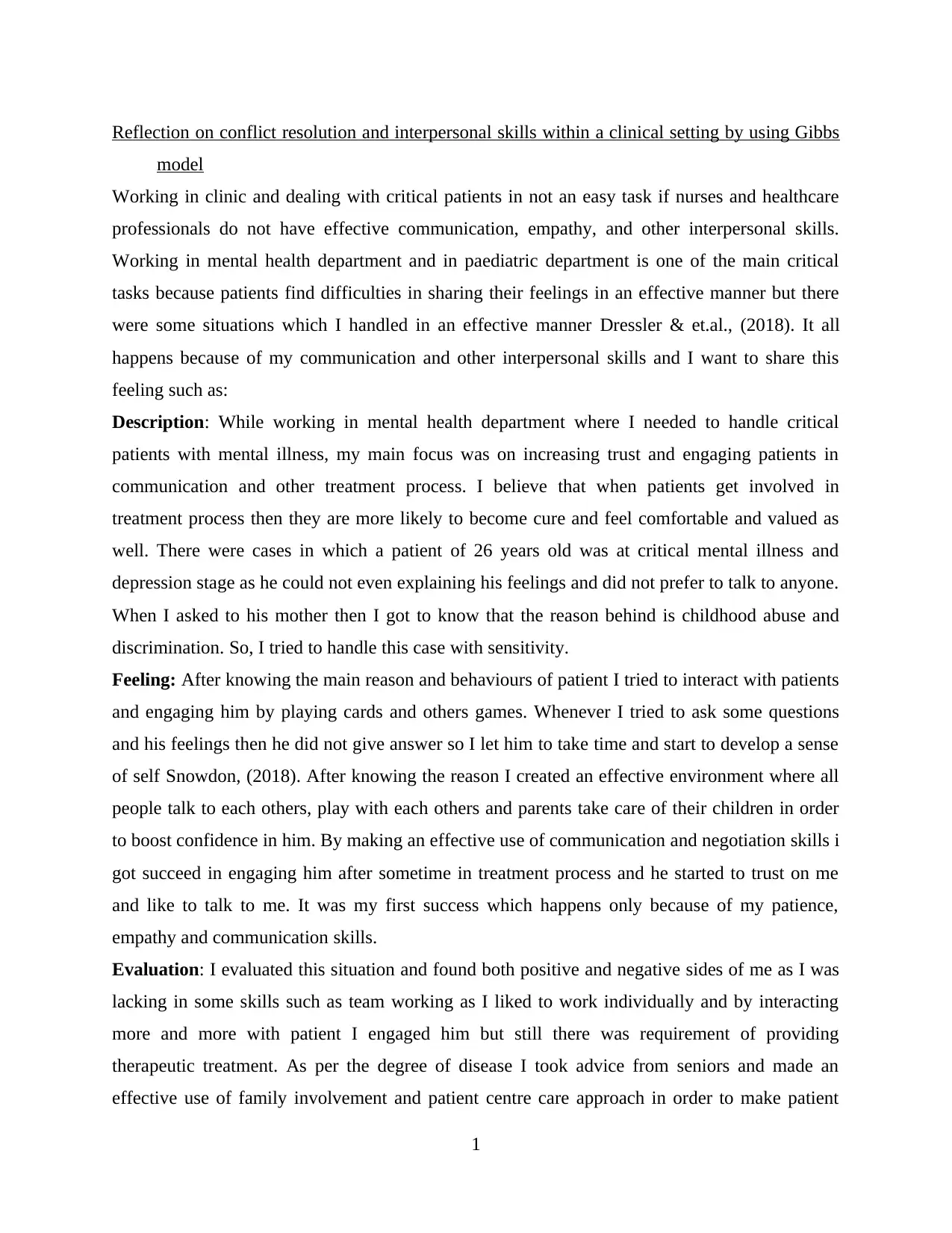
Reflection on conflict resolution and interpersonal skills within a clinical setting by using Gibbs
model
Working in clinic and dealing with critical patients in not an easy task if nurses and healthcare
professionals do not have effective communication, empathy, and other interpersonal skills.
Working in mental health department and in paediatric department is one of the main critical
tasks because patients find difficulties in sharing their feelings in an effective manner but there
were some situations which I handled in an effective manner Dressler & et.al., (2018). It all
happens because of my communication and other interpersonal skills and I want to share this
feeling such as:
Description: While working in mental health department where I needed to handle critical
patients with mental illness, my main focus was on increasing trust and engaging patients in
communication and other treatment process. I believe that when patients get involved in
treatment process then they are more likely to become cure and feel comfortable and valued as
well. There were cases in which a patient of 26 years old was at critical mental illness and
depression stage as he could not even explaining his feelings and did not prefer to talk to anyone.
When I asked to his mother then I got to know that the reason behind is childhood abuse and
discrimination. So, I tried to handle this case with sensitivity.
Feeling: After knowing the main reason and behaviours of patient I tried to interact with patients
and engaging him by playing cards and others games. Whenever I tried to ask some questions
and his feelings then he did not give answer so I let him to take time and start to develop a sense
of self Snowdon, (2018). After knowing the reason I created an effective environment where all
people talk to each others, play with each others and parents take care of their children in order
to boost confidence in him. By making an effective use of communication and negotiation skills i
got succeed in engaging him after sometime in treatment process and he started to trust on me
and like to talk to me. It was my first success which happens only because of my patience,
empathy and communication skills.
Evaluation: I evaluated this situation and found both positive and negative sides of me as I was
lacking in some skills such as team working as I liked to work individually and by interacting
more and more with patient I engaged him but still there was requirement of providing
therapeutic treatment. As per the degree of disease I took advice from seniors and made an
effective use of family involvement and patient centre care approach in order to make patient
1
model
Working in clinic and dealing with critical patients in not an easy task if nurses and healthcare
professionals do not have effective communication, empathy, and other interpersonal skills.
Working in mental health department and in paediatric department is one of the main critical
tasks because patients find difficulties in sharing their feelings in an effective manner but there
were some situations which I handled in an effective manner Dressler & et.al., (2018). It all
happens because of my communication and other interpersonal skills and I want to share this
feeling such as:
Description: While working in mental health department where I needed to handle critical
patients with mental illness, my main focus was on increasing trust and engaging patients in
communication and other treatment process. I believe that when patients get involved in
treatment process then they are more likely to become cure and feel comfortable and valued as
well. There were cases in which a patient of 26 years old was at critical mental illness and
depression stage as he could not even explaining his feelings and did not prefer to talk to anyone.
When I asked to his mother then I got to know that the reason behind is childhood abuse and
discrimination. So, I tried to handle this case with sensitivity.
Feeling: After knowing the main reason and behaviours of patient I tried to interact with patients
and engaging him by playing cards and others games. Whenever I tried to ask some questions
and his feelings then he did not give answer so I let him to take time and start to develop a sense
of self Snowdon, (2018). After knowing the reason I created an effective environment where all
people talk to each others, play with each others and parents take care of their children in order
to boost confidence in him. By making an effective use of communication and negotiation skills i
got succeed in engaging him after sometime in treatment process and he started to trust on me
and like to talk to me. It was my first success which happens only because of my patience,
empathy and communication skills.
Evaluation: I evaluated this situation and found both positive and negative sides of me as I was
lacking in some skills such as team working as I liked to work individually and by interacting
more and more with patient I engaged him but still there was requirement of providing
therapeutic treatment. As per the degree of disease I took advice from seniors and made an
effective use of family involvement and patient centre care approach in order to make patient
1
⊘ This is a preview!⊘
Do you want full access?
Subscribe today to unlock all pages.

Trusted by 1+ million students worldwide
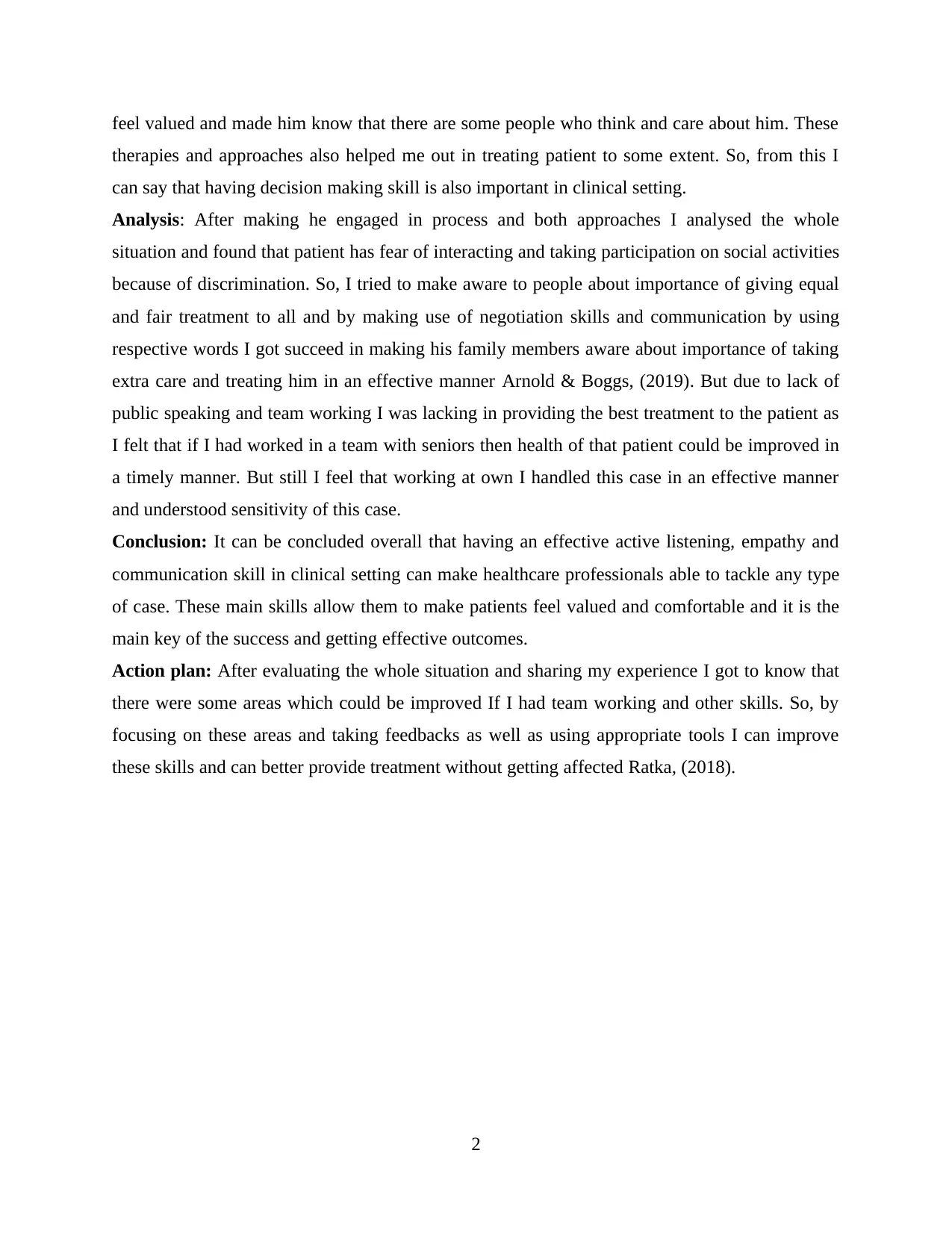
feel valued and made him know that there are some people who think and care about him. These
therapies and approaches also helped me out in treating patient to some extent. So, from this I
can say that having decision making skill is also important in clinical setting.
Analysis: After making he engaged in process and both approaches I analysed the whole
situation and found that patient has fear of interacting and taking participation on social activities
because of discrimination. So, I tried to make aware to people about importance of giving equal
and fair treatment to all and by making use of negotiation skills and communication by using
respective words I got succeed in making his family members aware about importance of taking
extra care and treating him in an effective manner Arnold & Boggs, (2019). But due to lack of
public speaking and team working I was lacking in providing the best treatment to the patient as
I felt that if I had worked in a team with seniors then health of that patient could be improved in
a timely manner. But still I feel that working at own I handled this case in an effective manner
and understood sensitivity of this case.
Conclusion: It can be concluded overall that having an effective active listening, empathy and
communication skill in clinical setting can make healthcare professionals able to tackle any type
of case. These main skills allow them to make patients feel valued and comfortable and it is the
main key of the success and getting effective outcomes.
Action plan: After evaluating the whole situation and sharing my experience I got to know that
there were some areas which could be improved If I had team working and other skills. So, by
focusing on these areas and taking feedbacks as well as using appropriate tools I can improve
these skills and can better provide treatment without getting affected Ratka, (2018).
2
therapies and approaches also helped me out in treating patient to some extent. So, from this I
can say that having decision making skill is also important in clinical setting.
Analysis: After making he engaged in process and both approaches I analysed the whole
situation and found that patient has fear of interacting and taking participation on social activities
because of discrimination. So, I tried to make aware to people about importance of giving equal
and fair treatment to all and by making use of negotiation skills and communication by using
respective words I got succeed in making his family members aware about importance of taking
extra care and treating him in an effective manner Arnold & Boggs, (2019). But due to lack of
public speaking and team working I was lacking in providing the best treatment to the patient as
I felt that if I had worked in a team with seniors then health of that patient could be improved in
a timely manner. But still I feel that working at own I handled this case in an effective manner
and understood sensitivity of this case.
Conclusion: It can be concluded overall that having an effective active listening, empathy and
communication skill in clinical setting can make healthcare professionals able to tackle any type
of case. These main skills allow them to make patients feel valued and comfortable and it is the
main key of the success and getting effective outcomes.
Action plan: After evaluating the whole situation and sharing my experience I got to know that
there were some areas which could be improved If I had team working and other skills. So, by
focusing on these areas and taking feedbacks as well as using appropriate tools I can improve
these skills and can better provide treatment without getting affected Ratka, (2018).
2
Paraphrase This Document
Need a fresh take? Get an instant paraphrase of this document with our AI Paraphraser
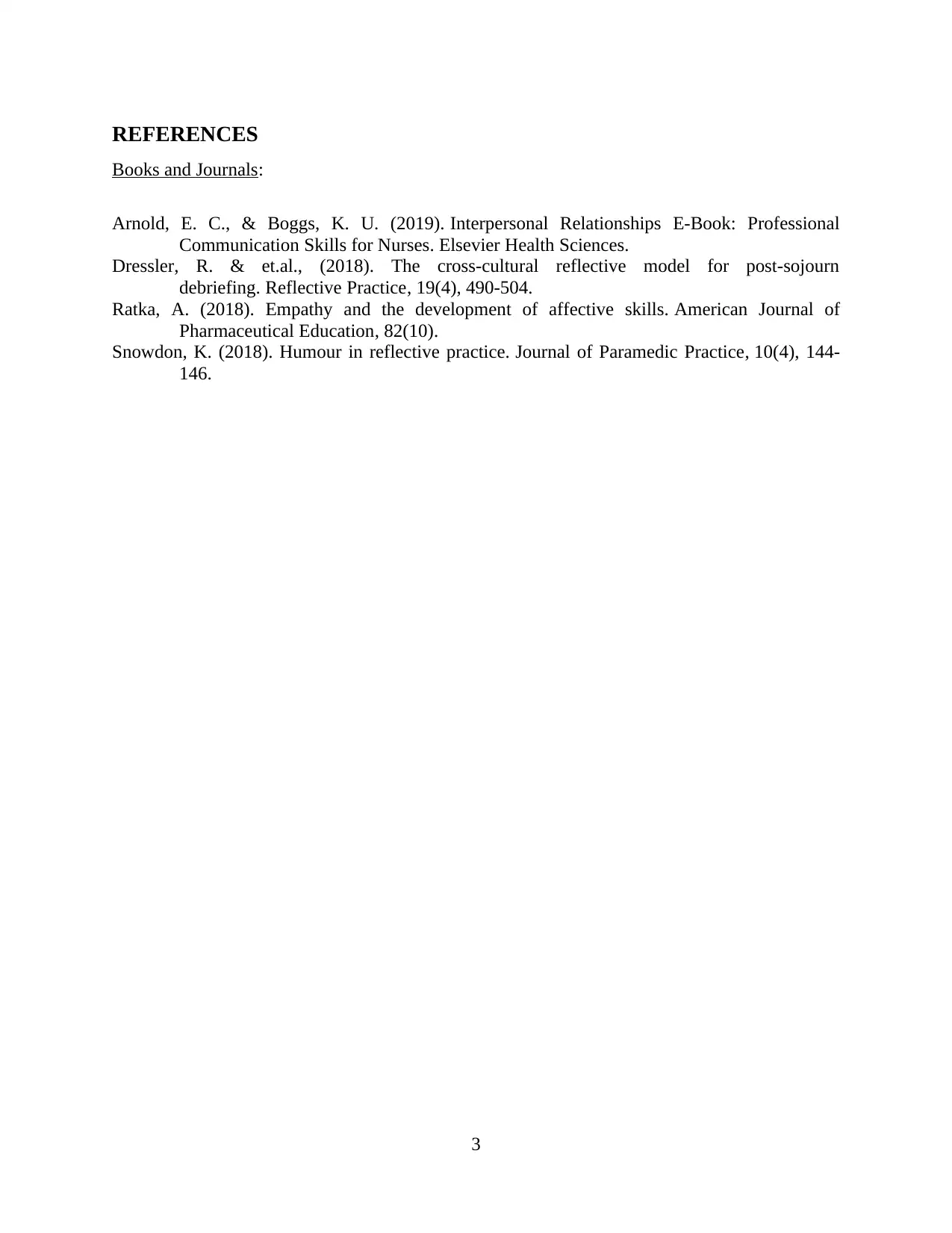
REFERENCES
Books and Journals:
Arnold, E. C., & Boggs, K. U. (2019). Interpersonal Relationships E-Book: Professional
Communication Skills for Nurses. Elsevier Health Sciences.
Dressler, R. & et.al., (2018). The cross-cultural reflective model for post-sojourn
debriefing. Reflective Practice, 19(4), 490-504.
Ratka, A. (2018). Empathy and the development of affective skills. American Journal of
Pharmaceutical Education, 82(10).
Snowdon, K. (2018). Humour in reflective practice. Journal of Paramedic Practice, 10(4), 144-
146.
3
Books and Journals:
Arnold, E. C., & Boggs, K. U. (2019). Interpersonal Relationships E-Book: Professional
Communication Skills for Nurses. Elsevier Health Sciences.
Dressler, R. & et.al., (2018). The cross-cultural reflective model for post-sojourn
debriefing. Reflective Practice, 19(4), 490-504.
Ratka, A. (2018). Empathy and the development of affective skills. American Journal of
Pharmaceutical Education, 82(10).
Snowdon, K. (2018). Humour in reflective practice. Journal of Paramedic Practice, 10(4), 144-
146.
3
1 out of 5
Related Documents
Your All-in-One AI-Powered Toolkit for Academic Success.
+13062052269
info@desklib.com
Available 24*7 on WhatsApp / Email
![[object Object]](/_next/static/media/star-bottom.7253800d.svg)
Unlock your academic potential
Copyright © 2020–2026 A2Z Services. All Rights Reserved. Developed and managed by ZUCOL.





